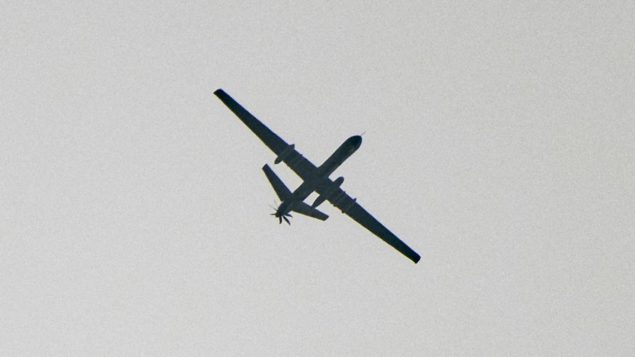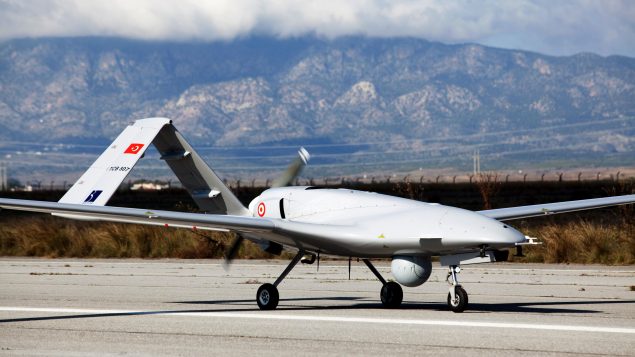A Canadian NGO is calling on Ottawa to ban exports of Canadian-produced sensors and laser targeting technology used by Turkish military drones deployed by Ankara across several conflict zones in the Middle East and Libya.
Disarmament group Project Ploughshares says the multimillion exports of high-tech sensors and targeting technology produced by L3Harris WESCAM in Burlington, Ont., are in direct contravention of Canada’s domestic laws and its international obligations under the United Nations Arms Trade Treaty (ATT) to which the Trudeau government acceded almost exactly a year ago.
In a major report released Tuesday, Project Ploughshares says “Canada’s export of WESCAM sensors to Turkey poses a substantial risk of facilitating human suffering, including violations of human rights and international humanitarian law.”
The report also alleges that the Turkish military “has committed serious breaches of international humanitarian law and other violations, particularly when conducting airstrikes” with the assistance of its Unmanned Aerial Vehicles (UAVs).
A ‘callous disregard for civilian lives’
“During recent operations, Turkish security forces have been repeatedly accused of indiscriminate airstrikes and targeting of civilians and civilian sites such as hospitals, schools, cultural locations, and critical infrastructure,” the report says.
“Reports from international human-rights monitors show that recent Turkish operations demonstrate ‘an utterly callous disregard for civilian lives, launching unlawful deadly attacks in residential areas that have killed and injured civilians.’”

A Turkish drone armed with missiles is seen patrolling the sky near Turkey’s border with Syria (Rami Al Sayed/AFP via Getty Images)
It appears that Turkey has also exported UAVs equipped with WESCAM sensors to armed groups in Libya, a blatant breach of the nearly decade-old UN arms embargo, the report adds.
L3Harris WESCAM, the Canadian subsidiary of U.S. defence giant L3Harris, is one of the world’s leading producers and exporters of electro-optical/infra-red (EO/IR) imaging and targeting sensor systems, with approximately $500 million in annual exports, according to the Project Ploughshares report.
Canadian tech critical to Turkish drones: NGO
These WESCAM imaging and targeting sensor systems, which basically allow drone operators to see what happens on the ground and paint targets for airstrikes by either the drone’s own missiles or other aircraft, are essential for Turkey’s ability to produce military drones, said Kelsey Gallagher, a Project Ploughshares researcher and the author of the report.
“These sensors are integral for their ability to conduct drone warfare, which they’ve done increasingly so in the past few years across several conflict zones,” Gallagher told Radio Canada International. “If the exports of these sensors were completely halted, then Turkey would not have the sensors necessary to conduct modern airstrikes.”
Turkey has been working on developing its own sensors and targeting systems but they are too heavy to be placed on Turkish-produced drones, making continued exports of WESCAM sensors a matter of national security from Ankara’s perspective, Gallagher said.
Exports continue despite arms embargo

Turkish President Recep Tayyip Erdogan (second left) is pictured with Turkish officials by the Akinci armed drone at the Teknofest show in Istanbul. ( Murat Cetinmuhurdar/Presidential Press Office/Handout via REUTERS)
The export of these WESCAM sensor systems have continued despite Ottawa’s freeze of defence exports to Turkey announced in October of 2019, following Ankara’s incursion into Kurdish-controlled areas of northern Syria, Gallagher said.
At the time, Global Affairs Canada said Turkey’s “unilateral action risks undermining the stability of an already fragile region, exacerbating the humanitarian situation and rolling back progress achieved by the Global Coalition Against Daesh, of which Turkey is a member.”
Gallagher said exports of WESCAM sensors nearly stopped in the beginning of 2020 but then increased again in the spring even as Canada extended its freeze on most arms exports to Turkey in April.
“This corresponds with some communication between the government of Canada and the government of Turkey that was reported to deal with an exemption on WESCAM systems specifically,” Gallagher said.
“As far as we understand, all other arms export permits [to Turkey] are still understood to be under a presumption of denial… with the exception of WESCAM.”
High level talks to secure Canadian sensors for Turkish drones
Prime Minister Justin Trudeau specifically discussed the issue of WESCAM exports to Turkey with President Recep Tayyip Erdogan during a phone conversation in April, according to sources who spoke with Radio Canada International on condition of anonymity.
Officials at the Prime Minister’s Office refused to comment on the issue, pointing only to the readout of a phone conversation between Trudeau and Erdogan on Apr. 23. That readout deals mostly with both countries’ response to the pandemic and only mentions cryptically that the two leaders also “discussed the trade and economic relationship between the two countries.”
The Turkish arms company Baykar Defence, one of the principal producers of military drones that use WESCAM sensors and targeting systems, also hired an Ottawa lobbyist to raise the issue with Canadian officials.
According to the website of the Office of the Commissioner of Lobbying of Canada, the lobbyist hired by the Turkish arms maker met with a high-ranking Canadian official in the Privy Council Office on Feb. 12, 2020.
‘Propaganda of a terrorist organization’
Officials at the Turkish embassy in Ottawa, referred questions about conversations between Trudeau and Erdogan back to the Prime Minister’s Office.
However, they were adamant in dismissing the Project Ploughshares report’s allegations as “completely false.”
“We completely reject any accusations against Turkey that are in that report,” the embassy said. “They are completely not true, they are completely false.”
The embassy said Turkey’s operations against the Kurdistan Workers’ Party, known under the acronym PKK (Partiya Karkerên Kurdistanê), and its Syrian offshoot, the Democratic Union Party (PYD) and the PYD’s military wing, the People’s Protection Units (YPG), were completely justified under international law because the PKK is considered a terrorist organization, not only by Turkey but also the U.S., EU and Canada.
The embassy said it “completely rejected any claims it has violated international humanitarian law.”
“This is just propaganda of a terrorist organization,” the embassy said, adding that Turkey takes “utmost care” to avoid civilian casualties in Syria and Iraq.
The embassy, however, did not deny claims that Turkey has provided military assistance, including drones, to the internationally recognized government of Libya.
“In Libya, Turkey is supporting the legitimate government against a warlord, [Khalifa] Haftar, and this is in line with the international law,” the embassy said.
‘Case-by-case basis and exceptional circumstances’
John Babcock, a spokesperson for Global Affairs Canada, said Canada has one of the strongest export controls systems in the world, and protection of human rights is enshrined in Canadian export controls legislation.
“Canada will consider on a case-by-case basis whether there are exceptional circumstances, including but not limited to NATO cooperation programs, that might justify issuing an export permit for military items,” Babcock said in an emailed statement.
“All new permit applications for controlled items, regardless of the destination, will continue to be reviewed under Canada’s robust risk assessment framework, including against the Arms Trade Treaty criteria, which are enshrined in Canada’s Export and Import Permits Act.”
Global Affairs Canada does not comment on individual permits or permit applications, he added.
“We have an obligation to protect confidential information about the commercial activities of individual companies,” Babcock said.
Officials with L3Harris WESCAM did not respond to Radio Canada International’s request for comment in time for publication.







For reasons beyond our control, and for an undetermined period of time, our comment section is now closed. However, our social networks remain open to your contributions.